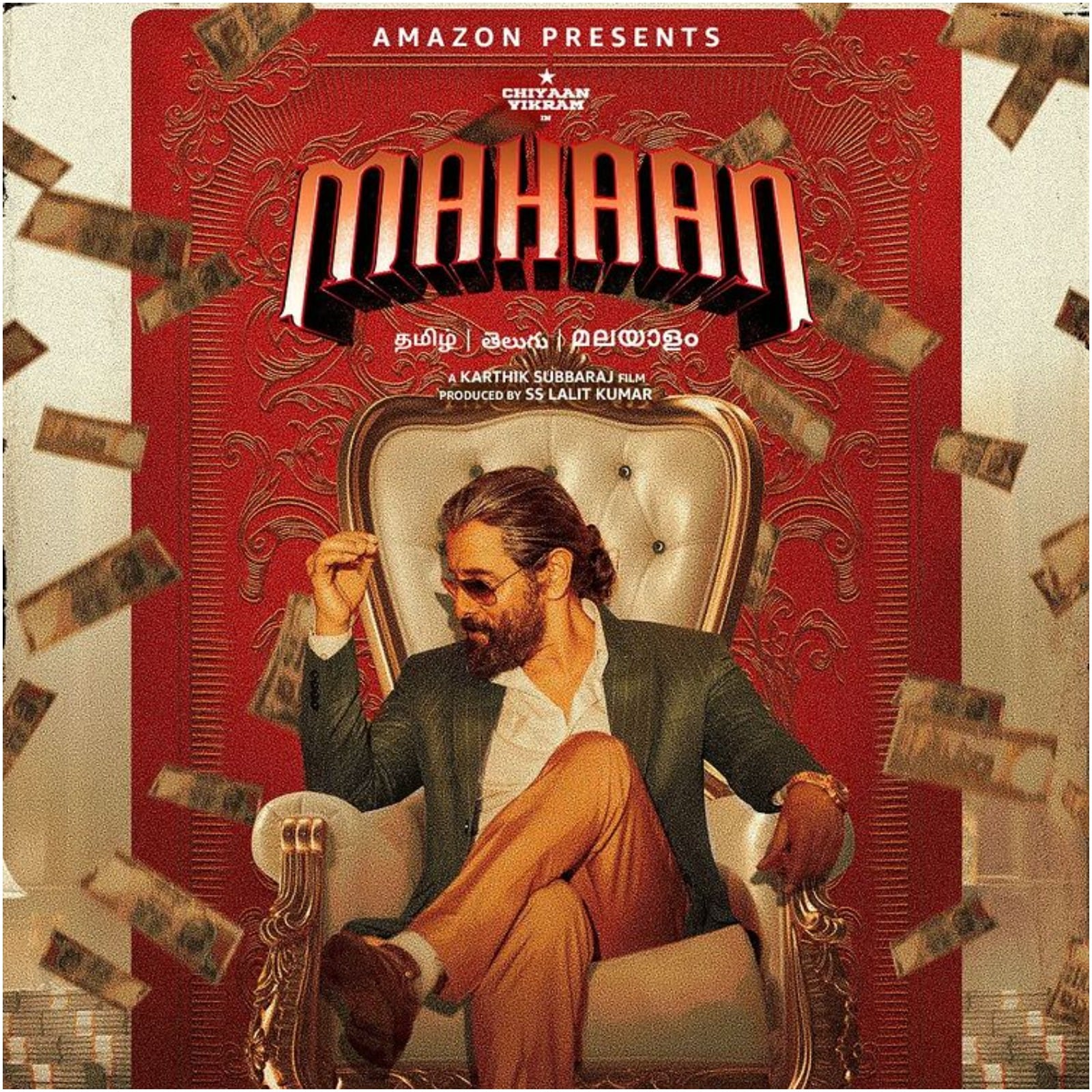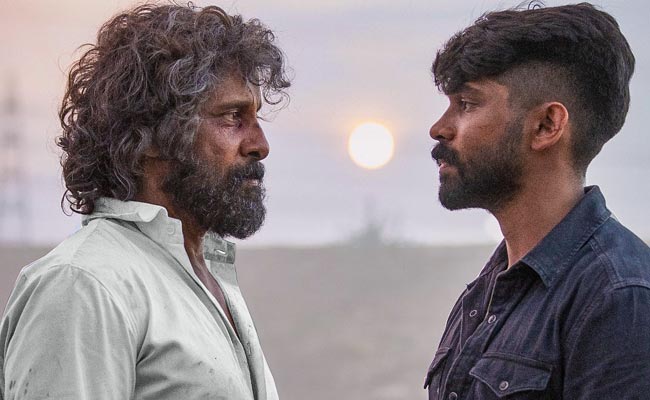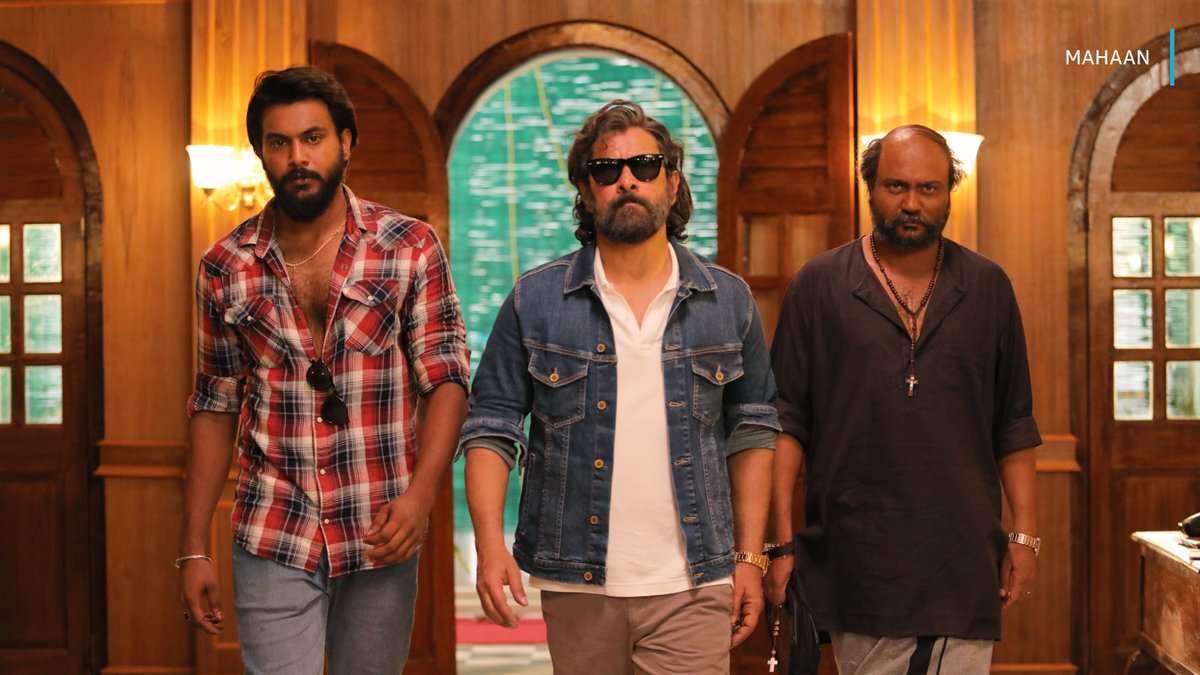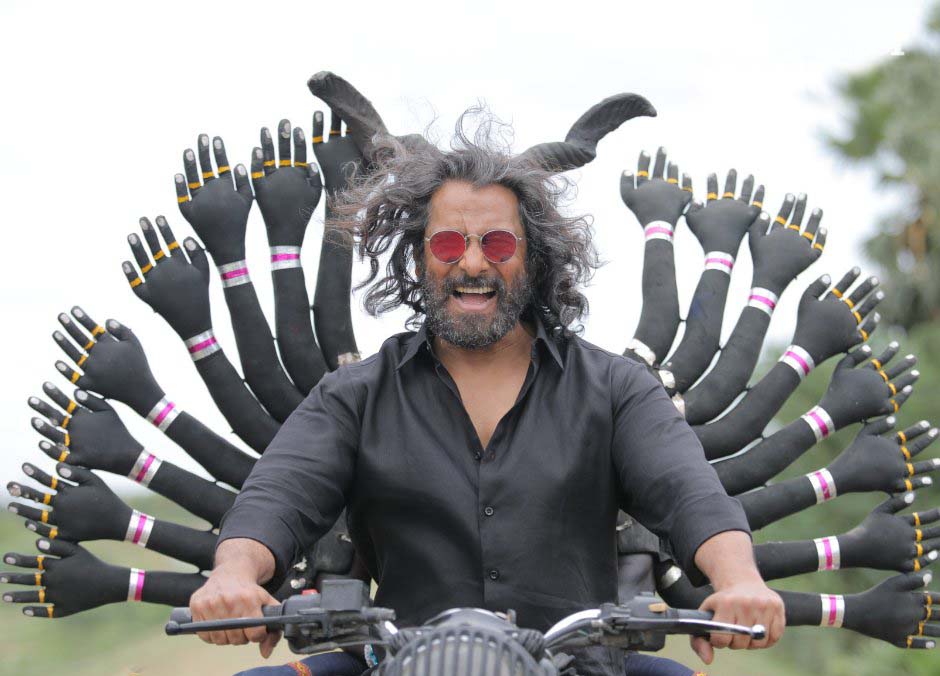Such a good movie! And also a good strong script. It feels like a classic from the past, but with a modern twists and themes. Very much an enjoyable ride from beginning to end, even when the plot gets a bit complicated, it is still easy to follow.
Summary:
In the 1990s, Gandhi Mahaan is an ordinary teacher of commerce who has been taught to behave as well as he can, since he bears the name of Gandhi, and was taught to live by Gandhian values. When on his 40th birthday night he lets go of the strict rules he has been living with it ends up with his wife Naachi leaving him with their son Dadabhai “Dada”. As a consequence Gandhi goes into the liquor business with a pair of old childhood enemies turned friends. Years go by and they are successful in having control of the liquor business in all Tamil Nadu. Things change however when Dada comes back with vengeance as ideologies and sons and fathers clash.

This is a classic story about fathers and sons, as well as of money and ideologies. A perfect marriage of both Masala and class in sheer enjoyment, as well as making you think a little harder on what is going to happen. It keeps you at the edge of your seat as the characters wrap you around their little finger before they make you hate them and empathise with them at the same time. The writer-director Karthik Subbaraj makes a story we have seen many times before fresh by its gray characters, shifting loyalties and heightened realism. It is very much a film that I want to rewatch many times just to catch it all. I especially loved how naturally everything flowed in terms of having characters meet or reunite.
The cinematography is splendidly done by Shreyaas Krishna, with the neon lights, familiar looking locations and strong frames giving this story an epic feel. A part of me wished it had not been released on steaming just because of it. Hopefully it can be re-released now that the theatres are open once more or at least have a special showing. There is even a fantastic fight sequence that would have been amazing to see on the big screen.
)
One can really call this is also a great showcase for Vikram’s range as Gandhi Mahaan as he goes from the ordinary, bored-out-of-his-mind, bird in a cage teacher to a gun-toting, bully beating, savvy bootlegger. The transformation is seamless, helped by great costuming and make up that is never overdone.
Gandhi is essentially a man having his long awaited rebellious phase that he did not get as a child or teenager because of his upbringing, so it shows up in his middle-age — making it seem like a midlife crisis to others — when it is merely the pent up frustrations of someone who hasn’t exactly lived a healthy life of choice in experimenting to see what his life could be except in rebelling as a child before being told not to. And when he does, decades later, it is because he has suppressed himself so much, he goes to the extremes when he has the opportunity to rebel. It almost feels like a self-fulfilling prophecy.
This rebellion also unleashes a dangerous side of him, one that is not afraid to hurt people (slapping his wife when he is confronted) and to kill when necessary. One cannot blame liquor for this, it is merely the side of him he has suppressed that is now unleashed. It is the bad side of all of us in a way. One can see that if he had been given the opportunity earlier to be freer, to not be the “pinnacle of the community” by being the face of the liquor-ban movement, he would have been able to set all of these vices into moderation or even grown out of most of them in time.
Heck, sometimes even there are those who try once or twice these kinds of stuff Gandhi does that first night, which isn’t anything bad really, and then never do it again. It is the big reaction to it that causes all the trouble in the end. One night is not bad, especially for a birthday, but if hiding it is the only way to feel alive then there needs to be a healthy talk and abandoning of the “pinnacle of community” business. Yet because such things cannot happen — also plot — the question is asked if the reaction had not been so grave would things have spiralled as bad as they did for both parties.
I am merely saying this as someone who comes from a country with a heavy drinking culture that is Finland where it is sometimes seen as odd if you don’t drink a little or at least finish a beer or a glass of champagne even at parties or national holidays. I should know, I am the one who declines a drink most of the time, but it is by choice, nothing else. Some drink to feel free, some drink to feel happy, some drink their sorrows away, sometimes it is just peer pressure or the culture…whatever the reason underneath there is always something there. To treat it as a moral sin I guess in my eyes is a bit extreme, because as we all know…if it is banned which means people will try to get it one way or another. It is a self fulfilling prophecy in the making.
Joining him in this bootlegging venture are a pair of old friends as they join hands in taking the hold of the liquor market in Tamil Nadu. The first one is a splendid Bobby Simha as Sathya, a man with a good heart, but a bad name. He sells liquor, yet because of his own father’s good name with people he is not doing as well. His son, Rocky played by Sananth is the one who introduces the old childhood friends to one another. These two become close to Gandhi as the story goes on, with Sathya and Gandhi taking long walks on the peer as they drink together. They were close as children and are even more so now, and Rocky even becomes a second son to Gandhi. This is a story also of found family, in its own way, and how blood is not necessary thicker than water, especially one with a bit of alcohol in it. The next friend is Gnanam played delightfully by Vettai Muthukumar who has risen high politically, but who still wants power. The reuniting of these three former friends is one of my favourite parts of the film, since you can feel he warmth, the same mischievousness coming to the surface when they are together.
This is also his son Dhruv Vikram’s second film as he acts as Gandhi’s son Dada. This being his second film shows in the slightest ways. There is a kind of self-awareness present even as he performs well that was at least noticeable to me. The kind of being a slight notch over the top, a little too aware of the acting, being aware of the camera and certain beats needed to hit, while still carrying on a scene and character. He is young so I expect he will grow into that comfortability, to be in that relaxed meditative yet vulnerable state of being in character while filmed, in time. But for now that “almost, not quite” tensity shows through that distracts slightly from his performance at least for me, made it a bit less “real”. I hope he will continue acting because he has the promise of becoming great given time.
I especially liked the few times Dada was vulnerable, because otherwise as a character he is very over the top, cold and angry. He has built these walls and set on vengeance as his aim to give payback for the hurt is father caused him and his mother. Those few vulnerable moments show the hurt little boy inside Dada, especially by the end, since most of the time he seems to be acting to shield himself from pain. Those few glimpses gave a humanity towards him — separate from the flashbacks — that is much needed to make this the tragedy that it is. I guess I would have wanted those moments to come a bit earlier than by the end, when we have mostly seen him in a murderous cold rage.
Gandhi’s wife Naachi is one of the most fascinating side characters in this story. Played by Simran she hits the perfect balance of being sufficiently dramatic, yet understandable in her rage. Even though the film frames the early scenes as her reaction to her husband’s one night of vice in drinking and partying in the most melodramatic light she never goes too over the top. Naachi essentially married one man, but then one night showed she had married another, and her view changed. She clearly loved him, but loved her son more, and so after turning into (not Maa Anand Sheela with purple robes) her views grow more extreme in being against everything her former husband represented. When she and Gandhi talk and spar later in the film it is fascinating to watch, since both are stubborn, have a heart, but are also too set in their ways.
The music by Santhosh Narayanan is catchy as anything. The tracks keep with you afterwards, especially with the hip-hop beats most of the songs have like ‘Rich Rich’ and ‘Evanda Enakku Custody’ which are perfect in embodying this childish power hunger and middle-aged partying feel in their time periods. My own favourite though has to be the folk infused ‘Soorayaatam’ which closes the first half, because if it has any folk elements which immediately means I love it.
The film is also a well done in its use of religious themes, philosophies and questioning them with the different characters. Crosses, church weddings, Tamil village folk festivals, images of Gods and Goddesses are prominent. Religious philosophy is set aside most of the times except when it comes to something like murder or if the job they are doing is too dangerous to continue. Gandhi Mahaan even uses the same type of glasses Gandhi used to and when he leaves, he carries the bust of the man under his shoulder. The father son theme of it all just adds to it with the whole prominence of the church that one is in fear of there will be a Jesus allegory at some point.
Overall this is a very good film with a very satisfying ending that will make you want to watch it again. Not only is it beautiful, but it is also an enjoyable journey with twists and turns on the way. The message is also a nice one, as well as the critique. I might not be a person who likes to drink alcohol, but I will gladly indulge myself in watching this movie with bootleggers and booze many times — and not always in moderation.
Thank you for reading!



Sounds like an interesting one! I love the description “middle-aged partying feel”–that’s definitely a distinct aesthetic for music to have, and I think I tend to identify it more readily as I approach middle age myself ( ;
LikeLike
The song really does sound like it but in the best complimentary way possible
LikeLiked by 1 person
Yeah, after leaving the comment I listened to it, and the picturization gives the same impression : )
LikeLike